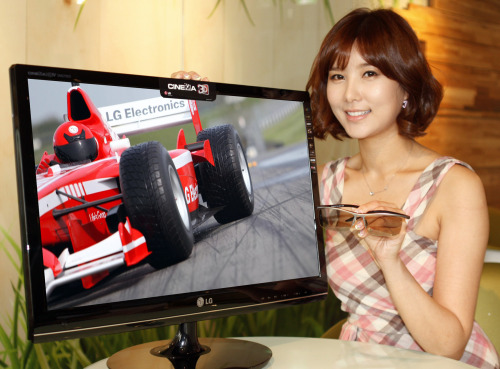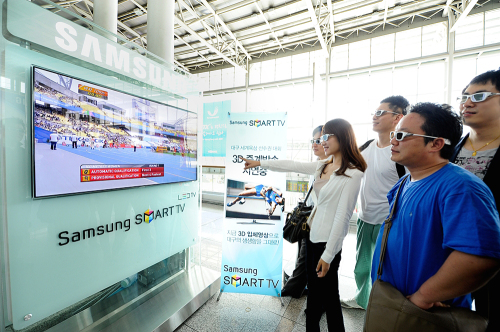
A model showcases a 27 inch “Cinema 3-D TV” in Seoul on Thursday. (LGE)
The information and technology industry is a rapidly changing one where the hottest trend of yesterday becomes an old one and gets replaced by another even before one realizes it.
In the midst of such trend, Korea’s two top rivals Samsung Electronics and LG Electronics are taking the lead in releasing their new line-up of 3-D televisions, each boasting a different display technology ― active vs. passive.
The two Seoul-based global firms have been bickering over the superiority of the active shutter glass technology and the passive film-type patterned retarder display technology since early this year.
However, an executive at LG Electronics recently confirmed that its fierce competitor Samsung, the world’s biggest TV maker, is taking a step away from the active 3-D display technology and picking up the passive 3-D display method.

Wearing glasses for Samsung’s 3-D TV, people watch the Daegu World Championships in Athletics at Seoul Station early this month. (Samsung Electronics)
“I heard Samsung will adopt the passive 3-D display technology although it will be different from the FPR technology supported by LG,” he said.
“Samsung will not be able to follow the exact tracks of LG, but it will present technology improved from its current shutter glass method.”
A Samsung spokesman strongly denied the statement but its ties with a U.S. firm shows that it already seems to be headed toward adopting the new form of active 3-D technology, despite Samsung’s attempts to differentiate it from LG’s retarder technology by calling it “active shutter.”
Samsung unveiled 3-D TVs supported by the new “active shutter” technology, together with U.S.-based solution firm RealD earlier this year. The Samsung official said the name of the technology was changed from “active retarder” to “active shutter” under the agreement of two companies, however, industry sources say the former name’s association with the FPR technology may have been the reason for the change.
3-D TVs operating on the active shutter display method offers full high definition resolution but it requires an additional patterned retarder to attach on the TV display screen, driving up the TV costs. It could also reduce the resolution compared to the shutter glass method because of a different screen display method that divides the screen vertically.
“It’s not a 3-D display technology supporting the passive method, but one that is based on the active method, but a more developed one,” said the Samsung official.
LG officials have recently been showing confidence for the first time of beating Samsung on a particular product.
The LG executive’s statement is most likely to have a big impact on the industry for Samsung has been bashing at LG for touting the passive 3-D display technology, stating that it is a technology from 1935.
“The passive method was already developed in 1935 and all (LG) did was cut down the costs. The quality and performance is worse than what it had in the past,” Yoon Boo-keun, the TV chief at Samsung Electronics, said in a press event earlier in February.
LG supported the active shutter glass technology, but decided to adopt the passive 3-D display technology that enables the offering of affordable TV sets and cheaper 3-D glasses, releasing them for the first time in the local market in late February.
Market research firm DisplaySearch said it already has seen a shift from the first generation (active shutter) to passive shutter glasses.
“These have the advantage for consumers of reduced flicker and increased image brightness, as well as enabling the frame designs which do not have to enclose electronics and LCD elements in the lenses,” it said.
Samsung Electronics, Sony and Panasonic are major supporters of the active shutter glass method, while the group for the passive FPR technology includes LG Electronics, Toshiba and Philips.
By Cho Ji-hyun (
sharon@heraldcorp.com)







![[KH Explains] Hyundai's full hybrid edge to pay off amid slow transition to pure EVs](http://res.heraldm.com/phpwas/restmb_idxmake.php?idx=645&simg=/content/image/2024/04/18/20240418050645_0.jpg&u=20240419100350)